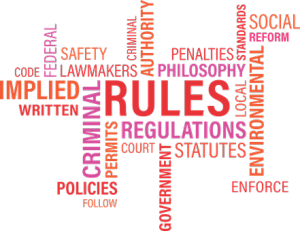 Some of the areas in which businesses make their largest investments of time and expense are trade secrets (including customer lists) customer relations and client development, and employee development. However, these interests may conflict, especially when highly placed employees leave a firm. This is an area of potentially bitter dispute in New Jersey business law and employment law.
Some of the areas in which businesses make their largest investments of time and expense are trade secrets (including customer lists) customer relations and client development, and employee development. However, these interests may conflict, especially when highly placed employees leave a firm. This is an area of potentially bitter dispute in New Jersey business law and employment law.
Businesses have many trade secrets, but the most important of these is often information regarding its customers. Because of intense competition, and the time, effort and expense which businesses invest in cultivating their clients, customer lists, especially customer lists in service industries, are protected by the common law and New Jerseys Trade Secrets Act.
Businesses also invest significant expense in training and developing their employees, even aside from salary and benefits. Thus, New Jersey business law and employment law imposed a duty of loyalty on employees, even those who do not have a restrictive covenant. This duty of loyalty prohibits employees from competing with their employers while they are employed. An employee may not induce her employer’s employees or customers to leave her employer, nor may she appropriate her employer’s trade secrets. The employee may plan to leave, and if the employee does not have a restrictive covenant she can even seek employment with competitors or even set up a business entity which will compete with the employer after she leaves. However, the employee cannot go beyond the planning stage while still employed.
 New Jersey Lawyers Blog
New Jersey Lawyers Blog


 are business entities. It is one of the strongest of New Jersey’s
are business entities. It is one of the strongest of New Jersey’s  The New Jersey Appellate Division recently issued a decision which found an arbitration agreement unenforceable against a plaintiff who was alleging age discrimination under New Jersey’s Law Against Discrimination,
The New Jersey Appellate Division recently issued a decision which found an arbitration agreement unenforceable against a plaintiff who was alleging age discrimination under New Jersey’s Law Against Discrimination,  The Appellate Division of New Jersey’s Superior Court recently issued an instructive decision about arbitration agreements in employment law disputes. The case does not invalidate arbitration agreements – they are protected by both federal and New Jersey law – but it does show that the trend is that arbitration agreements are being construed strictly against the employers which drafted them.
The Appellate Division of New Jersey’s Superior Court recently issued an instructive decision about arbitration agreements in employment law disputes. The case does not invalidate arbitration agreements – they are protected by both federal and New Jersey law – but it does show that the trend is that arbitration agreements are being construed strictly against the employers which drafted them. In December of 2017 New Jersey’s then-Governor Chris Christie signed off on several pieces of legislation to help those with criminal histories turn their lives around and become more productive members of society. For example, Governor Christie
In December of 2017 New Jersey’s then-Governor Chris Christie signed off on several pieces of legislation to help those with criminal histories turn their lives around and become more productive members of society. For example, Governor Christie  Very often, a person or business will want to confer a benefit on a third party but will not be able to do so itself, for a variety of reasons. So then, to make sure the benefit will be conferred, it will enter into a contract with a person or business which has the ability to confer the benefit. The question, then, is what rights does the third-party beneficiary have?
Very often, a person or business will want to confer a benefit on a third party but will not be able to do so itself, for a variety of reasons. So then, to make sure the benefit will be conferred, it will enter into a contract with a person or business which has the ability to confer the benefit. The question, then, is what rights does the third-party beneficiary have? New Jersey’s Supreme Court adopted new rules which became effective September 1, 2018. These rules amend New Jersey’s Rules of Court to make the litigation of complex business law matters more efficient. This article discusses some of the major changes the new rules have brought about.
New Jersey’s Supreme Court adopted new rules which became effective September 1, 2018. These rules amend New Jersey’s Rules of Court to make the litigation of complex business law matters more efficient. This article discusses some of the major changes the new rules have brought about. Before you enter into an agreement to purchase a franchise, it is vital to review and understand the documents you are being required to sign. You will be required to execute the following documents:
Before you enter into an agreement to purchase a franchise, it is vital to review and understand the documents you are being required to sign. You will be required to execute the following documents: The United States District Court for the District of New Jersey recently issued a decision which illustrates some of the weaknesses in both Federal and New Jersey Employment law, particularly Title VII of the Civil Rights Act of 1964 and New Jersey’s Law Against Discrimination. Our attorneys represent both employers and employees in employment law, and this issue is of utmost concern to us.
The United States District Court for the District of New Jersey recently issued a decision which illustrates some of the weaknesses in both Federal and New Jersey Employment law, particularly Title VII of the Civil Rights Act of 1964 and New Jersey’s Law Against Discrimination. Our attorneys represent both employers and employees in employment law, and this issue is of utmost concern to us. As previously discussed
As previously discussed